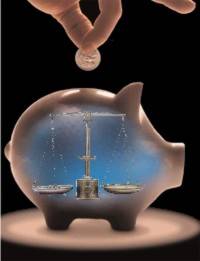 Because new wealth in the form of 'material value' (those tokens with values that are held in common by actors) can only be released through a process of relationships, relationship management is the only management discipline that can create/change value.
Because new wealth in the form of 'material value' (those tokens with values that are held in common by actors) can only be released through a process of relationships, relationship management is the only management discipline that can create/change value.For example, people need a relationship to be able to swap money for food where both parties understand 'value' inherent in coins, notes and credit cards. The lump of metal, piece of paper or plastic card represent values but in themselves are valueless.
The nature of the culture for people to understand such values varies. There are many parts of the world where a Euro coin or note and bank credit card would be unacceptable as a metaphor for wealth. It would be difficult for a traveller to 'pay' for water in poverty stricken Africa with Euro coinage or pay for an iPod in Alabama.
However, if the relationship between the participants was such that there was enough trust, it is possible for the exchange to take place even if the food vendor was un-familiar with the coinage.
It would seem that relationships are more valuable than representations of wealth.
This then begs the question as to what a relationship is. What are its components.
In the example above, we can see that there may be an instance when relationships can cross cultures when there is sufficient trust. Trust trust is the belief by one person that another's motivations towards them are benevolent and honest. In a commercial relationship this means that the purchaser needs to believe that the transaction offered benefits worth at least the cost of acquisition and that the vendor is not ripping them off. The latter is achieved through a level of transparency. Thus there are a set of values that are inherent in such transactions. Ideas such as trust metrics show how such values can accrue.
The value comes before and is often confused with reputation. Reputation reflects corporate value and values. There is a take on this from Mori. Reputation, then is one way of measuring corporate value (and begs the ethical 'question should PR work for enhanced value or attempt to create 'reputation' without the underlying value being present?').
Barbara Misztal attempts to combine notions of trust together. She points out that there are three basic things that trust does in the lives of people. It makes social life predictable, it creates a sense of community, and it makes it easier for people to work together.
This suggests that trust has other values which are associated with time, relationships and justice and in particular the values associated with creating a nexus of relationships which make up a community and allow common enterprise as well as common context.
Trust is, thereby, easier to come by in social groups and cultures which have 'material values'.
This would suggest that the idea of the continual conversation in the organisation and the culture where it has or needs a licence to operate is significant. It suggests that this conversation has to extend and exchange values with a wider constituency (more than simple views of stakeholders) and offers a better route to achieving transaction. It also undermines the concept of advertising operating outside a relationship building strategy.
Does this mean that advertising's proper place is as a tool in relationship management. I believe it is. Advertising is effective as a tool of Public Relations in the sense of it being not just a set of skills but a relationship management discipline.
Picture: Wealth and Justice
Hey,
ReplyDeleteThanks for sharing this blog its very helpful to implement in our work
Regards.
Hire a Hacker